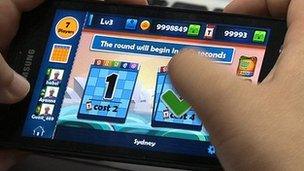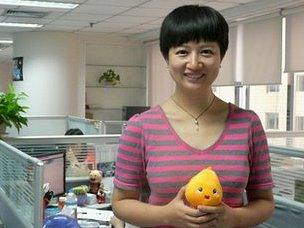Si Shen: On rebuilding her games firm PapayaMobile
- Published
Founder of PapayaMobile Si Shen talks about rebuilding her business after falling off Apple's platform
Does the entrepreneurial spirit run in families? One company founder who thinks it might is Si Shen, of PapayaMobile, which produces games for mobile phones.
Si Shen was born and grew up in China. Her mother was a successful lawyer, but she was not satisfied with her lot.
Whilst she was still a child, her family moved to Shenzhen in southern China, an area known as a hot spot of business activity, where her mother started a real estate enterprise.
When she was growing up, Ms Shen says that like many other Chinese children she dreamt of becoming a scientist.
But as she grew older and thought more deeply about what she wanted to do with her life, she began to have other ideas. Her mother's example influenced her heavily.
Ms Shen recalls that she read a lot of books, and one that made a big impact on her was The Road Ahead by Microsoft founder Bill Gates.
"He had a dream when he was really young, 'I want everybody to be able to have a computer, a personal computer on their desk.' And because of this dream, he changed the world."
She remembers thinking: "That's so cool! I want to do something like that!"
Ms Shen studied at the prestigious Tshingua University in Beijing, and subsequently at Stanford University in California.
By this time she was certain she wanted to start a technology company. At a party she met a fellow graduate of Tshingua who had become a successful entrepreneur.
He advised her that before starting something herself, she needed to gain some business experience first.
Gaining experience
Ms Shen applied for a post at Google but she never lost sight of her ultimate goal.
At the interview she was asked what she expected to be doing in five years' time. She replied that she would not still be working for Google, saying "I'm going to be in China and I'm going to be working on my own company."
She got the job.
After working as a product manager for Google for several years, she left and returned to Beijing where she and a friend launched Papaya in 2008.

Si Shen's mobile phone games have attracted millions of players
They decided to concentrate on the mobile phone market. After trying various avenues, they settled on games as being a sector that showed particular promise.
At the time in China there was a computer game called Happy Farm that was extraordinarily popular.
Its success inspired Ms Shen and her colleagues to try to produce a similar game that could be played on mobile phones, such as Apple's iPhone.
The game was called Papaya Farm and it proved to be a turning point.
"All of a sudden it went really, really popular - and we got millions of users."
'I couldn't sleep'
Things went well for the business until late 2009, when Ms Shen received a frantic call telling her that all the company's games had suddenly been removed from Apple's App Store.
As this happened during the Thanksgiving holiday in the US, she could not reach anyone at Apple to find out what was going on.
The news could not have come at a worse time, because the start-up was trying to raise funds for expansion.
"Our investors told us, 'If your products don't get back to the App Store, we're not going to give you the money.' That was a very serious situation," she remembers.
"I couldn't sleep because we have 15 employees. Everybody was looking at me every day. They were like, 'What are we going to do?' and I couldn't give them an answer."
She decided to fly to the US, more specifically to Apple's headquarters in Cupertino in California, and spent the day waiting in the reception area.
Eventually, she spoke to a company executive, who explained that there were some technical issues with Papaya's games.
"Basically if we didn't change the whole infrastructure of our games, there was no way we could go back to iPhone," she recalls.
She was devastated. Her investors pulled out and she knew she had to do something fast.
'You have to have back-up'
She quickly decided to take the risk of moving Papaya's games to a different mobile phone system, Google's Android platform.
She took the chance because although Android was just getting established at the time, she knew "it was going to be big".

Si Shen says she knew Google's Android platform would be successful
Her bet paid off. Papaya's games proved popular on phones running the Android system.
Later, after making some technical changes, the company's games were allowed back on sale through Apple's App Store.
Ms Shen says she learnt a lot from the episode, gaining a better understanding of how the business world works and the dangers of putting all your eggs in one basket.
"As a start-up, you cannot just rely on one platform, because one day if that platform tells you 'no', then you lose everything. You have to have back-up."
She has also learned a lot about herself.
Until then her whole business experience had been very smooth, and she had not known "the taste of failure".
"That taught me that no matter what happens, if you believe what you are doing - just be persistent, anything can be overcome."